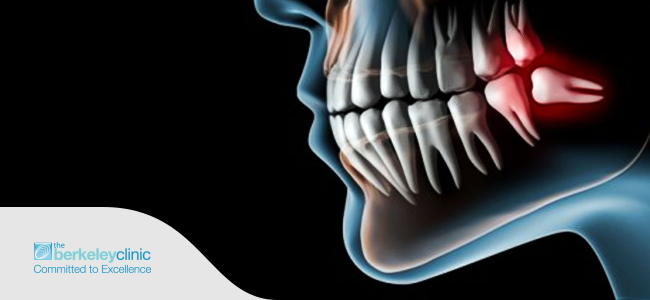What is the recovery after wisdom teeth extraction?

Wisdom teeth are the final set of molars that most people get between the ages of 17 and 25, however, in some cases they may appear many years later or even not at all. When the teeth in your mouth are properly aligned and healthy getting your wisdom teeth is simply the last step of getting your set of 32 teeth. Unfortunately, in many cases the wisdom teeth are misaligned, which may cause crowd or damage of adjacent teeth, nerves or the jawbone. In these cases they will need to be removed.
Wisdom teeth appear at different times and sometimes only partially break through the gum. This allows for bacteria to enter and cause an infection to the tooth. They are also prone to infection and decay as they are difficult to brush and floss. At Berkeley Clinic orthodontist Glasgow we offer a variety of dental treatments for any case and we are well-equipped to solve any problems that you may have with your wisdom teeth.
Do you have wisdom teeth?
The wisdom teeth are the last set of teeth, positioned at the back of your mouth. They appear last so it is usually easy to identify when you have them. Whether they have appeared or not, you can ask you cosmetic dentist Glasgow to check their positioning during your next dental check-up. If they are not visible your orthodontist Glasgow may take an x-ray to evaluate their alignment. If a potential problem is identified your dentist may recommend removing the wisdom teeth. This is easier and the recovery is faster in young people as the wisdom teeth roots are not fully developed and the bone density is lower.
How are wisdom teeth removed?
This will depend on their positioning and stage of development. Your orthodontist Glasgow will discuss the procedure with you during the pre-extraction examination. If the wisdom teeth is fully erupted the procedure of extraction is the same as with any other tooth. If, however, the tooth is underneath the gum an incision will be required. Before the extraction a local anaesthetic is used to numb the surrounding teeth and tissue. This is usually the same anaesthetic used during filling a cavity. You and your cosmetic dentist Glasgow may decide to use an additional sedative to control any anxiety.
Berkeley Clinic uses some of the most modern methods of sedation including inhalation Sedation or Nitrous Oxide/Laughing gas, Intravenous Sedation, Oral Sedation and Dental Hypnosis. Depending on the method of sedation used, you may need someone to accompany you to the appointment and drive you back home.
What is the recovery after wisdom teeth extraction?
Your recovery will depend on the difficulty of the procedure. During the first 24 hours after the extraction bleeding may occur. You can control it by positioning a piece of clean moist gauze over the tooth socket and biting down firmly, applying pressure for about 45 minutes. Avoid hot liquids, smoking and drinking through straws as these can cause dislodge of the clot.
Facial swelling is common in the area of the extraction. Apply ice wrapped in a cloth for 10 minutes and remove for 20. Repeat if necessary. Painkillers can help for mild pain and your dentist may prescribe more potent ones if needed. Antibiotics can be prescribed before and after the tooth extraction in some cases.
Your diet should be restricted to liquid foods until the numbness from the local anaesthesia is gone. Stick to soft foods for a couple of days and avoid alcohol if you are taking painkillers. Brush your teeth, but avoid the area of the extracted teeth for the first 24 hours. Do not use mouth washes.
After the first 24 hours facial swelling should be treated with a warm towel – 20 minutes on, 20 minutes off. You can rinse your mouth with warm salt water (cup of water and half teaspoon of salt) after each meal and before going to bed. Complete healing is expected between a few weeks and a few months from the extraction, depending on the individual case.
Are there potential complications?
Two complications that may occur are Dry socket and Paresthesia. Dry socket occurs when a blood clot has failed to form in the tooth socket or has been dislodged. This usually occurs 3 or 4 days after the extraction causing pain and foul mouth odour. Paresthesia is a rare complication in which nerves are bruised or damaged during the tooth extraction causing numbness of the tongue, chin or lip. If you experience any of these symptoms contact your dentist as soon as possible.

Trusting Berkeley Clinic Glasgow
Wisdom teeth removal may sound scary and may make you anxious, but it is a common procedure and many people go through it without complications. It can also save you from developing a more serious condition that could cost you more time and money and cause you more pain. At Berkeley Clinic we specialise in a range of dental treatments including root canal treatment and dental implants Glasgow and we have experienced, professional team that can take care of all your needs. To ensure that your teeth are well taken care of contact us today and book our dental check-up.
Tags: impacted wisdom tooth, molar extraction, teeth surgery, wisdom teeth, wisdom teeth removal, wisdom teeth removal cost, wisdom teeth surgery, wisdom tooth extraction, wisdom tooth extraction cost, wisdom tooth pain, wisdom tooth pain relief


